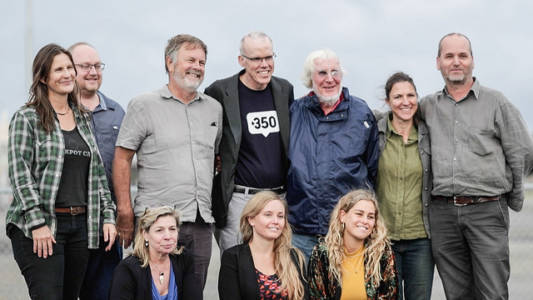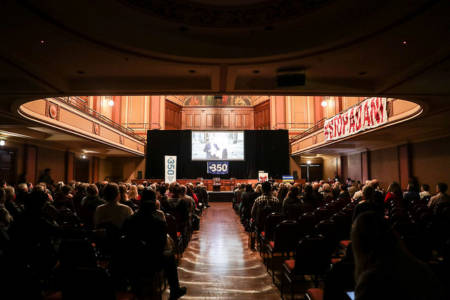By Glen Klatovsky, 350 Australia Deputy CEO
I spent ten years living in the Hunter. It is a place close to my heart. It is also one of the most important regions globally with respect to our future and how we deal with the scale and impacts of climate change.
Newcastle was founded in the late 18th century by John Shortland who saw a coal seam in a hill as he sailed up the coast from Sydney. Within 5 years Newcastle was founded and the first ever export from the colony of New South Wales was a shipful of coal from Newcastle.
Today Newcastle exports more coal per year than any other port on earth.
The Hunter also hosts huge coal-fired power stations fed by the coal mines as well as the biggest consumer of electricity in NSW, the Tomago aluminium smelter. The future of the Hunter is very much tied to the future of the coal industry, both domestically and globally.
This is why we made Newcastle the first stop of 350.org founder Bill McKibben on his latest tour.
Global trends on divestment, the rise of renewables and litigation are germane to the people of the Hunter. Our first act in Newcastle with Bill was to host a roundtable, hosted by Newcastle Trades Hall, with key stakeholders. Local, state and federal politicians, unions, CSIRO, University of Newcastle, finance sector, local community and climate advocates sat together to look at the need for a transition with a focus on the speed the transition may be. For 350 Australia this is the beginning of a much longer engagement in the region.
Bill then got to see the coal loaders servicing the port. The scale is awesome and forces you to contemplate the task ahead of us all. This was a great opportunity for many active members of the community to spend some time with Bill.

Back row from left: Su Morley, Glen Klatovsky, Andrew Styan, Bill McKibben, John Hayes, Charlotte McCabe, James Whelan Front row from left: Blair Palese, Naomi Hogson, Rachael Scott. Image: Samantha Hawker
In the evening we hosted a wonderful community event at Newcastle Town Hall.
Bill spoke alongside Vanessa Petrie, CEO of the extraordinary community group Beyond Zero Emissions (BZE). BZE has a strong base of volunteers in the Hunter looking at the transition to renewables following their pivotal work in Port Augusta which has undergone a fundamental transition over the last 5 years.
Then we were all moved by Hunter landholder, Bev Smiles, who is a part of a community resisting coal mine proposals that threaten their properties. What an inspirational group of passionate people who are confronted by huge corporate and government power, hellbent on digging up their valley. This compelling story ended in a standing ovation and quite a few tears.
There is a growing realisation in Newcastle and the Hunter that change is happening and must happen.
The rise of renewables, of litigation and of divestment is a global tide beyond the control of people in the Hunter and even politicians in Canberra. As a nation, we have three options: to ignore this tide, to push against this tide, or to ride the wave. 350 advocates the third of these options.
As Bill pointed out in his presentation around the country, the decision by the Newcastle City Council to divest from fossil fuels in 2016 was globally powerful and demonstrated exceptional leadership. More leaders across the Valley have indicated the need to take steps. Late last year the new Chair of the Newcastle Port stated that the future for the port is not coal.
How this change is managed is incredibly important. Without serious preparation, thousands of people will be left on the scrap heap. From a 350 perspective, the people who are most likely to be negatively impacted by the transition need to be involved in the process and prioritised.
Over the next few months, we will continue to build our relationships with people in the Hunter and work with those organisations keen to make progress on a just transition. We are looking to partner with organisations for the Rise events in September. Our hope is that the Rise campaign continues to build momentum for action on climate change in one of the most important global litmus test sites.
Regardless of what Australia does the Hunter will be completely different in 2050. How that transition occurs is up to all of us.
In September, 350 Australia will be involved in a global push to Rise for Climate Action. To join us, sign up to our newsletter here.

